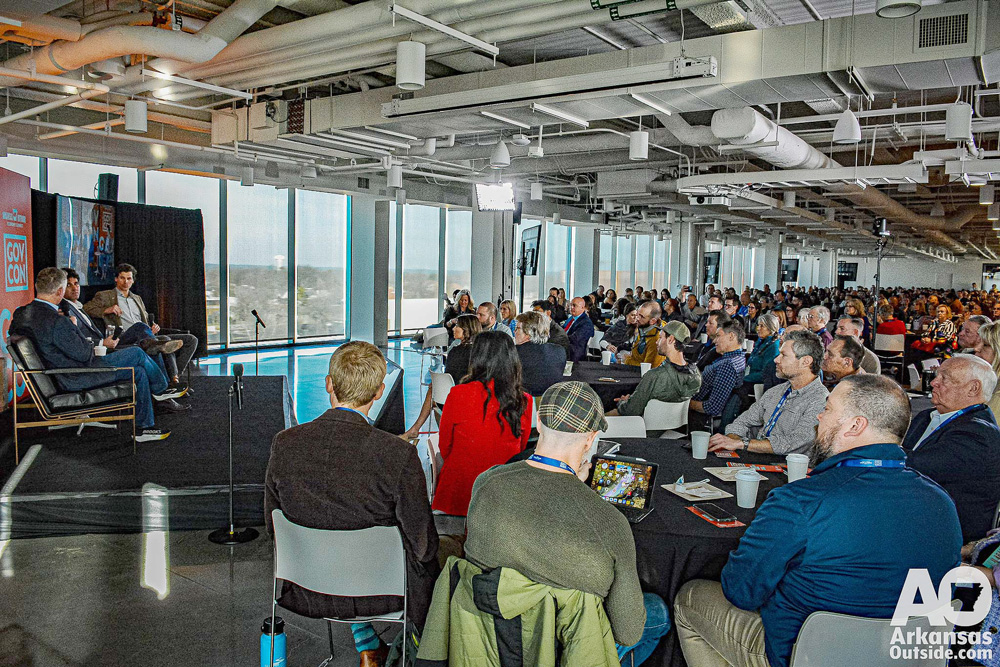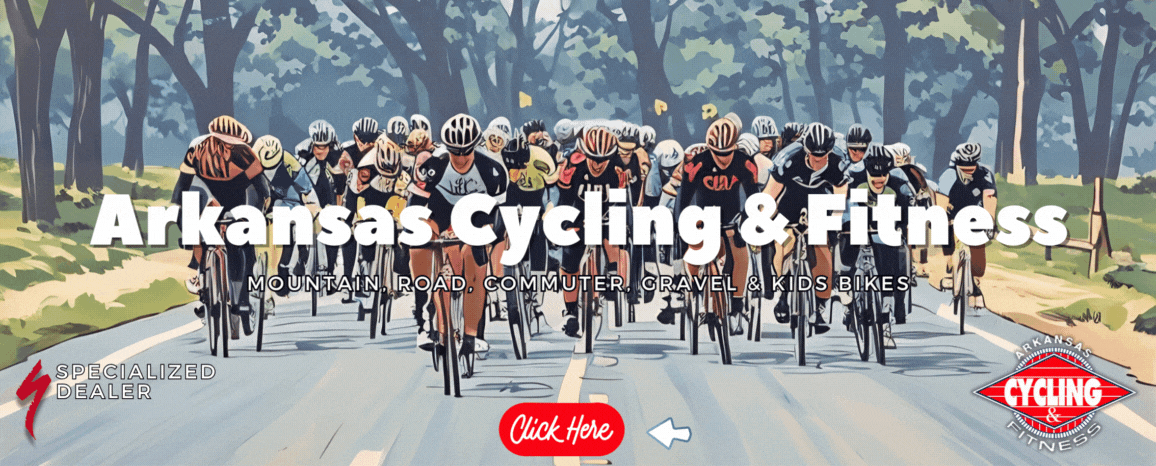On February 24, 2025, Bentonville, Arkansas, became the focal point for tourism and outdoor recreation as it hosted the 51st Arkansas Governor’s Conference on Tourism alongside the second annual Arkansas Outdoor Economy Summit. Organized by the Arkansas Department of Parks, Heritage and Tourism, the event convened industry leaders, tourism professionals, and outdoor enthusiasts to discuss the future of Arkansas’s expanding outdoor economy.
Fireside Chat Highlights Outdoor Vision for Arkansas
The summit opened with a fireside chat featuring Tom Walton, co-founder and CEO of Runway Group, and First Gentleman Bryan Sanders. Moderated by Robin Thurston, CEO of Outside, Inc., the discussion focused on the future of outdoor recreation in Arkansas and its growing impact on tourism and economic development. Walton and Sanders shared their perspectives on leveraging Arkansas’s natural assets to cultivate a robust outdoor culture.

Walton, a Bentonville native, credited his parents for fostering his passion for the outdoors. “We spent lots of time running around in the woods,” he recalled, emphasizing early experiences with overnight paddling trips and introducing his own children to mountain biking at a young age.
Sanders, originally from Kansas City, discovered a love for the outdoors through skiing, which influenced his decision to attend college in Maine. After relocating to Arkansas, he recognized the state’s potential for outdoor recreation. “Arkansas is unique, particularly in this region of the country,” he said, citing activities such as hiking, gravel cycling, and fly fishing as major draws for visitors and residents alike.
The panel also addressed the economic benefits of outdoor recreation, with Walton highlighting the transformation of Bentonville into a world-class mountain biking destination. He emphasized the cost-effectiveness of trail development, stating, “Soft-surface singletrack costs about $5 per foot, compared to over $200 per foot for paved paths.”
Sanders compared Arkansas’s potential to that of Colorado and Utah, which have built economies around skiing. “Arkansas has the same opportunity around mountain biking and cycling,” he said. “You can ride year-round here, and when you see people from Colorado driving to Arkansas to ride in winter, you know we’re onto something special.”
Arkansas’ Outdoor Economy: A Multi-Billion Dollar Industry
A report from Heartland Forward revealed that Arkansas’s outdoor recreation industry generated $7 billion in 2023, supporting 69,000 jobs and contributing nearly $2 billion in tax revenue.
“Outdoor recreation isn’t just about fun—it’s about economic development, jobs, business growth, tourism, and overall quality of life for Arkansas,” said Jonas Crews of Heartland Forward.

Northwest Arkansas has emerged as a major outdoor hub, with its Oz Trails network attracting cyclists, hikers, and outdoor enthusiasts. “We’re not just the mountain biking capital of the world—we’re a hub for trail innovation,” Crews said.
The economic impact extends beyond recreation to outdoor manufacturing, with startups like LIVSN, SwampOx, QuackRack, HighTag, and Battle Armor Designs joining established companies such as Ranger Boats and Remington in boosting the state’s economy.
The growth is not confined to Northwest Arkansas. Hot Springs, with its historic bathhouses and access to Lake Ouachita, and Mountain Home’s White River, a prime fishing destination, are also benefiting from increased outdoor tourism.
“What’s exciting is that we’re seeing growth spread across the state,” Crews noted. “From Hot Springs to Bull Shoals, outdoor recreation is creating opportunities in communities large and small.”
Read more details on Arkansas Outdoor Recreation Data.
Building a Workforce for the Outdoor Industry
The “Building Tomorrow” session addressed the need for workforce development to support the outdoor economy. Industry leaders emphasized partnerships between educational institutions and businesses to equip Arkansans with relevant skills.

Chris Perkins, Vice President of Programs at the Outdoor Recreation Roundtable, outlined key workforce challenges: skill development, career marketing, diversity and inclusion, and affordability in rural areas. “If I go to someone off the street and say there’s work for you in the outdoor industry, that person is likely to say, ‘I want to be a park ranger.’ But outdoor careers span a diversity of industries and skill sets,” Perkins said.
Bruce Stanton of Pradco Outdoor Products shared his company’s commitment to employee development and retention, citing initiatives like a dedicated company-wide fishing holiday. “We give everybody the Thursday before Memorial Day off to go fishing, take a selfie, and build a culture that’s more than just a job,” Stanton explained, illustrating the company’s approach to fostering a positive work environment.
Educational institutions are responding to this need. Dr. Megan Bolinder of Northwest Arkansas Community College detailed the school’s new Trails and Trades Division, designed to train trail technicians and other outdoor professionals. “We’re trying to standardize skill development while ensuring it’s contextual to the region,” she said.
Entrepreneurship also plays a role in workforce development. Dr. Zoe Maddox of the University of Arkansas highlighted the Greenhouse Outdoor Recreation Business Incubator, which has supported 39 companies, particularly in the cycling sector.
Entrepreneurs and Outdoor Industry Success Stories
A panel of business leaders discussed Arkansas’s role in fostering outdoor industry success. Rick Pierce of Bass Cat Boats, Amanda Herget of Gearhead Outfitters, and Taylor Cassat of SABO Outdoors shared insights on navigating business challenges and leveraging the state’s natural resources.

“Fishing is sort of a hub here… Quality anglers come to Arkansas more than any other state in the country,” Pierce said.
Herget, whose company expanded from a single store in Jonesboro to 22 locations across seven states, attributed growth to community support. “If you take care of the community, the community takes care of you,” she said.
For startups like SABO Outdoors, Arkansas’ entrepreneurial ecosystem has been pivotal. “The Greenhouse program provided us with a $15,000 non-equity grant, mentorship, and a network that helped us rethink our business infrastructure,” Cassat said.
Balancing Growth with Conservation
A session on sustainability addressed the challenge of expanding outdoor recreation while preserving natural resources.

Kalene Griffith, CEO of Visit Bentonville, highlighted the economic contribution of outdoor recreation, noting its $4.5 billion impact on the state’s GDP. “Our job is to make sure we continue to inspire people to appreciate the outdoors because those who conserve it are inspiring,” she said.
Grady Spann, CEO of Northwest Arkansas Land Trust, emphasized the role of conservation in protecting natural habitats. “If I don’t allow people to engage with the natural environment, they won’t understand why it’s important to protect it,” he said.
Adam Cramer, CEO of Outdoor Alliance, discussed balancing recreation with conservation through responsible management. He cited the bipartisan Explore Act as a model for supporting both public land protection and outdoor access. “If you ultimately want to protect land, don’t cut people out. Do it in a careful, thoughtful way,” he said.
Looking Ahead
The Arkansas Outdoor Economy Summit and Governor’s Conference on Tourism underscored the state’s commitment to expanding outdoor recreation while fostering economic growth and conservation. As industry leaders, policymakers, and entrepreneurs continue to collaborate, Arkansas is positioning itself as a premier destination for outdoor enthusiasts and a leader in the outdoor economy.
This article was originally published on ArkansasOutside.com, your trusted source for outdoor news and updates in The Natural State. Unless otherwise credited, all photos included in this piece are the property of Arkansas Outside, LLC. We take pride in sharing the beauty and adventures of Arkansas through our lens—thank you for supporting our work!






